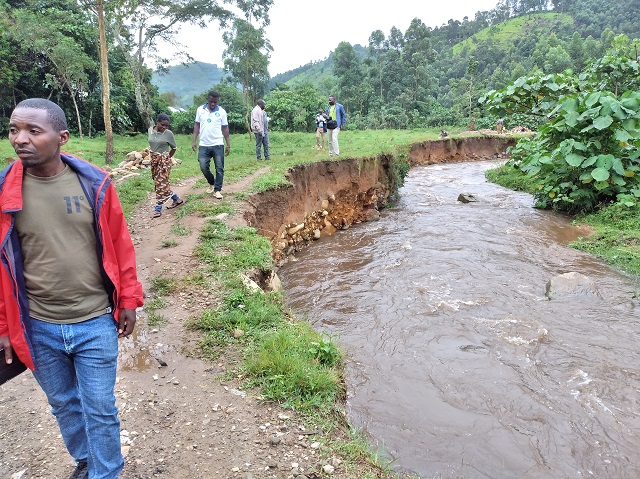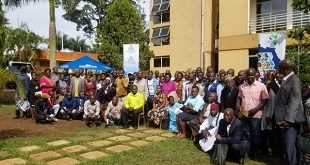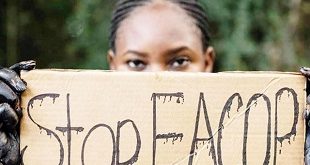
Kampala, Uganda | Ronald Musoke | Ugandan youth have been among the strongest voices calling for urgent global action to address climate change. Many whom The Independent has talked to say when the 26th UN Framework Convention on Climate Change (COP26) opens in Glasgow, Scotland, on Oct.31, they will be watching proceedings keenly. They hope this time the global leaders will “stop talking and act.”
“For many years, there has been a lot of talk on various forums across the world and all the youth are asking for now, is action,” said Michael Kakande, the co-chairperson at Resilient 40; a pan-African non-profit youth network committed to building climate resilience.
“As we hold this conversation, there is someone who is dying somewhere because of climate change-related impacts,” he told The Independent on Oct.28.
Perhaps the most powerful voice came from Vanessa Nakate, a Ugandan climate justice activist during the Youth4Climate Summit in Milan, Italy, in September this year.
Nakate noted how in the past few years, she has seen how the climate crisis is affecting her country and the African continent. She said she finds this ironic given that Africa is the lowest emitter of greenhouse gases of all continents except for Antarctica.
“Africa is only responsible for about 3% of global emissions and yet Africans are already suffering some of the most brutal impacts fuelled by the climate crisis.” Nakate points to the recent devastating floods, withering droughts and hurricanes which she says are intensifying.
“Many Africans are losing their lives while countless more have lost their livelihoods. The droughts and floods have left behind nothing for the people; nothing except for pain, agony, suffering, starvation and death.”
She said loss and damage used to be something people in the developed world used to think of as something that only happens in the developing countries like Uganda but recent events like the wild fires in California and Greece and floods in Germany and Belgium have shown that loss and damage is now possible everywhere.
Nakate said she never hears global leaders talk about loss and damage occasioned by climate change impacts.
“For many of us, reducing and avoiding (climate change impacts) is no longer enough. You cannot adapt to lost cultures, you cannot adapt to lost traditions. You cannot adapt to lost history and you cannot adapt to starvation and you cannot adapt to extinction.”
“Climate action is not a pick and choose thing. It is true we need to avert and minimize the future impacts of climate change as much as possible but we also need to take care of the loss and damage that is already happening.”
“It is time to take care of those who are most vulnerable from the climate change impacts which are no longer avoidable. Loss and damage has been whispered about on the edges of past COPs and it is time for leaders to put loss and damage at the centre of the negotiations.”
“We need funding to help us deal with the damage that has already been caused and the damage that we will not be able to avoid no matter how much mitigation and adaptation is put into place.
It is time to acknowledge that there must be additional funding on top of what has been promised for mitigation and adaptation.”
Uganda is already suffering from the impacts of climate change and extreme weather events are becoming increasingly common in many parts of the country. Uganda has been noted to be the 12th most vulnerable country in the world according to the Notre Dame Global Adaptation Index 2021 report.
More worrying is the fact that the country has one of the youngest populations in the world with 77% of its 42 million citizens being under 25 years old. Over 7.3 million of these youth are aged between 15 and 24 years old. Millions of these youth are not gainfully employed and in their quest to eke a living have resorted to destroying forests and wetlands to grow quick maturing crops to earn an income.
But Edwin Muhumuza, the founder and chief executive officer of Youth Go Green Uganda; a non-profit that works across Uganda to promote environment conservation and green jobs among youth, says the same youth have the capacity to restore the environment if they are well supported.
He told The Independent on Oct.28 that the Ugandan youth are concerned about the global climate crisis and they are hoping the issue of climate financing will be taken a little more seriously at COP26.
“We urge the global leaders to think deeply about funding for green initiatives,” Muhumuza told The Independent. “There should be an arrangement to access multi-lateral financing and we urge the leaders to prioritise and urgently set aside climate financing for the youth who are engaged in climate projects.”
The COP26, which is taking place in Glasgow between Oct. 31 and Nov. 12, is hosted by the UK in partnership with Italy.
In their recent meeting with the British High Commissioner to Uganda, the Ugandan youth shared their position on COP26. They noted how they have innovative ideas and huge potential that can be harnessed for the successful implementation of the country’s Nationally Determined Contributions (NDCs), Uganda’s third National Development Plan, the Sustainable Development Goals (SDGs), the Paris Agreement, the African Agenda 2063, the African Union Youth Charter and Vision 2040— Uganda’s long term development blueprint.
Uganda has been quick to develop its Nationally Determined Contributions (NDCs) strategies to respond to climatic episodes such as frequent floods, storms, fires and droughts. These have been designed around building a low-carbon development pathway and reduction of the vulnerability of the population.
The government has particularly come up with measures and policies that build resilience in the energy, transport, agriculture, waste, forestry and wetlands while similar adaptation strategies have been made targeting infrastructure, water, energy and health sectors.
On Oct. 21, Kate Airey, the British High Commissioner to Uganda together with Chilufya Besa, the country director for the British Council in Uganda hosted a Climate Youth Engagement event bringing together prominent young Ugandan climate actors and key members of the Ugandan COP26 delegation.
The event, hosted in Kampala by the British High Commission, was designed to give a platform to prominent Ugandan climate activists to share and discuss their concerns about climate change in Uganda, the region and globally with key members of the Ugandan COP26 delegation in advance of their trip to the UK.
It was an opportunity for young people to speak about their hopes for COP26 and the actions they would like to see come from it. It was also a chance to give young people a voice in Uganda’s climate negotiations. The youth participants were also encouraged to share a written statement entitled ‘Uganda Youth Statement of Priorities for COP26.’
“COP26 is a critical moment, not just for Uganda but for the whole world and collaboration is key. We need the whole world to come together and commit to ambitious climate action and that includes youth,” Airey said.
“Youth have a key role to play in raising ambition, but also in implementing action. This is an opportunity to send a message to both the UK Presidency and the Ugandan delegation on what their priorities should be and what a successful COP should look like”
Besides a lack of ready funds to implement the programmes, the Ugandan youth noted earlier, during a national validation workshop on Uganda’s NDCs, how they think the country’s climate change adaptation and mitigation effort have gaps that need to be fixed.
Below are what the youth think should be the priorities for COP26
Youth on NDCS:
- Engage youth, youth organisations, youth groups in the implementation of the Nationally Determined Contributions and build their capacity on new skill sets brought by the Nationally Determined Contributions
- Support youth who have innovative research and development ideas and huge potential that can be harnessed for the successful implementation of Uganda’s NDCs.
Gender and Climate Change
- Address climate change and gender capacity gaps in human resources at both the national and district level to ensure smooth coordination and implementation of gender responsive measures in NDCs.
- Improve women’s access to services that support adaptation; including providing women with better land tenure systems, agricultural services which are solar powered, and access to climate information, technology, aid, and access to early warning systems.
- Urge climate financing institutions to prioritise projects and programmes on gender and climate or significantly integrate gender and climate change considering that currently, only a tiny portion of climate financing goes into gender and climate change according to the OECD.
Agriculture
- Encourage the reduction of hazardous chemicals and Greenhouse Gas emissions to promote sustainable food systems and a healthy planet
- Implement an adaptation mechanism to improve nutrition, ensure food security and water security
- Offer incentives to green enterprises and access to Climate Finance to upscale smart innovations in the agriculture sector and promote Agro-ecology.
Renewable Energy
- Government needs to subsidize taxes on renewable energy to enable more renewable energy companies to invest in Uganda thereby promoting clean energy and green jobs
- There is a need for innovative financing solutions that pair funding with coaching, mentorship, and skill building resources for young people while creating space for young innovators in the renewable energy industry to help them access funding to improve their innovations
Climate Finance & Technology Transfer
- Urge the Green Climate Fund, the African Development Bank, and all other multilateral finance institutions to prioritise, release and urgently scale up climate financing for youth employment and green livelihoods and innovation opportunities across Uganda through a special consideration for the youth.
- Invest in local green business incubation centers that are run by and used by young people so that they can have data driven innovations and inventions for continued development of the country
Action for Climate Empowerment
- Invest in Climate education with integration in both primary and high school curricula by the ministry of education so that every learner gets basic information about climate change
- Nominate ACE National Focal Points and provide them with the necessary institutional support for their activities such as developing and implementing national strategies on ACE
- Invite relevant institutions to invest in capacity building of African youth in Research and policy engagement on the four sectors of the Intergovernmental Panel on Climate Change (IPCC) namely, Energy, Agriculture Forest, and other Land Use (AFOLU), Industrial Processes and Product Use (IPPU) and Waste Management
Climate Change Negotiations
- Call for integration, capacity building and financing of Ugandan youth in climate change negotiation processes at national, regional, and international levels
- Develop a national junior negotiators programme to mentor future negotiators.
 The Independent Uganda: You get the Truth we Pay the Price
The Independent Uganda: You get the Truth we Pay the Price



